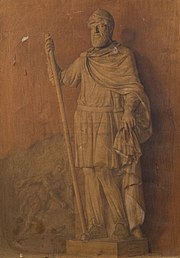TIRIDATES EL REY MAGO - CASSIUS DIO
https://en.wikipedia.org/wiki/Tiridates_I_of_Armenia#Visiting_Rome
Visiting Rome[edit]
Prior to embarking for Rome, Tiridates I visited his mother and two brothers in Media Atropatene and Parthia. On his long trek he was accompanied by his wife and children and two of his brothers. His escort included an imposing retinue, comprising many feudal lords, several sages, 3,000 Parthian horsemen, and also a large number of Romans.[8] His route lay across Thrace, through Illyria, on the eastern shores of the Adriatic and Picenum, in northeastern Italy. The journey took nine months, and Tiridates I rode on horseback, with his children and queen at his side.[28] The children of Vologases, Monobazes and Pacorus also accompanied Tiridates I.[29]
Cassius Dio, a second-century Roman historian, described Tiridates I favorably at the time of his arrival: "Tiridates himself was in the prime of his life, a notable figure by reason of his youth, beauty, family, and intelligence."[29] Nero greeted Tiridates I at Neapolis (Naples) in October, sending a state chariot to carry the visitor over the last few kilometres.
According to Dio's account, Tiridates I refused to remove his sword as he approached the ruler of the Roman Empire (though as a compromise, he agreed to have his sword firmly fastened in the sheath, so that it could not be drawn).[30] Nero was reportedly so impressed by this act that he ordered a gladiatorial games be staged in honor of his guest at Puteolis (present day Pozzuoli, near Naples). According to Cassius Dio, the Armenian king himself had an opportunity to display his ability as a marksman by shooting an arrow through the bodies of two buffaloes.[30] Ethiopian women, men and children fought as gladiators and gladiatrices at the games to impress the Armenian king.[31]
The climax of the ceremonies was reserved for the capital. Rome was profusely decorated with flags, torches, garlands and bunting, and was gorgeously illuminated at night with great crowds of people seen everywhere.[32]
On the day after Tiridates I's arrival, Nero came to the Forum clothed in triumphal vestments and surrounded by dignitaries and soldiers, all resplendent in expensive attire and glittering armor. While Nero sat on the imperial throne, Tiridates I and his retinue advanced between two lines of soldiers. Arriving in front of the dais, Tiridates I knelt, with hands clasped on his breast. After the thundering shouts and acclamations excited by this spectacle had subsided, Tiridates I addressed the emperor:
To which Nero replied:
Tiridates I then mounted the steps of the platform and knelt, while Nero placed the royal diadem on his head. As the young king was about to kneel a second time, Nero lifted him by his right hand and after kissing him, made him sit at his side on a chair a little lower than his own. Meanwhile, the populace gave tumultuous ovations to both rulers. A Praetor, speaking to the audience, interpreted and explained the words of Tiridates, who spoke in Greek.[36] According to Pliny the Elder, Tiridates I then introduced Nero to magian feasts (magicis cenis).[37] Tacitus claimed that Tiridates I was also interested in all things Roman.[38]
Public festivities continued for some time after the coronation ceremony. The interior of the Theatre of Pompey and every piece of its furniture was entirely gilded for the occasion; for this reason, Rome thenceforth recalled that date as "the Golden Day." Daytime festivities were on a scale no less lavish than those of the night: Royal purple awnings stretched as protection against the heat of the sun. Nero, clad in green and wearing a chariot driver's headdress, took part in a chariot race. At the evening banquets, Nero, in gold-embroidered vestments, sang and played the lyre with zither accompaniment. Tiridates I was amazed and disgusted by Nero's extravagance, but he had only praise for Corbulo and expressed to Corbulo his surprise at his serving such a master.[39] He made no concealment of his views to Nero's face and said to him sarcastically: "Sire, you have a wonderful servant in the person of Corbulo."[39]
In memory of these events, the Senate honored Nero with the laurel wreath and the title of Imperator, or commander-in-chief of the armies. No reception comparable to this in magnitude and splendor is recorded in the history of Rome. Besides the enormous sum spent in festivities, the Roman Government bore the entire cost of the journey of Tiridates I and his retinue, both from and to their homeland. Nero also made a gift to Tiridates I of fifty million sesterces.[40]
On his journey back to Armenia, Tiridates I viewed an exhibition of pancratium. When seeing that one of the contestants fell on his back and was being beaten by his opponents, Tiridates I saw exclaimed: "That's an unfair contest. It isn't fair that a man who has fallen should be beaten."[39]
Later, Nero summoned the Parthian King Vologases I to Rome several times, but when the invitations became burdensome to Vologases I, he sent back a dispatch to this effect: "It is far easier for you than for me to traverse so great a body of water. Therefore, if you will come to Asia, we can then arrange to meet each other."[39]
It has been suggested that the visit of Tiridates I, an event that greatly impressed contemporaries, was adapted by Christians to become the story of the adoration of the Christ Child by the Three Magi.[41] The Christian legend changed Rome into Bethlehem, the birthplace of the Ruler of the coming Kingdom of God, and replaced Tiridates I with that contemporary king who was already connected with Christianity through the Acts of St. Thomas: Gondophares, otherwise known as Kaspar.[42]
http://penelope.uchicago.edu/Thayer/E/Roman/Texts/Cassius_Dio/home.html

